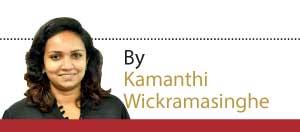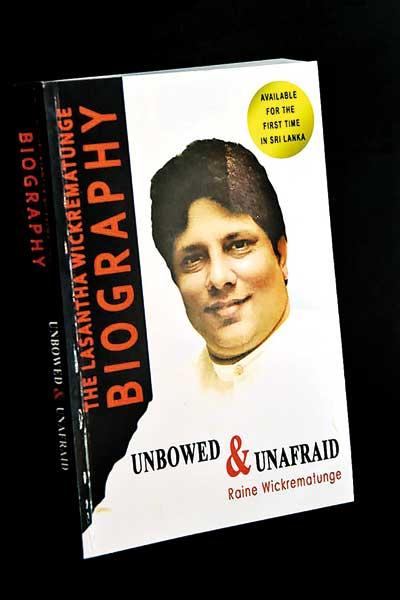Reply To:
Name - Reply Comment
Biography of slain journalist Lasantha Wickrematunge launched
“Life is slowly ebbing away. And the minutes that tick by seem like an eternity. He lies bleeding, moaning and suffering. The world is becoming a blur...Every crimson drop that falls tells the story of a good man, a visionary who would never give up his crusade for justice and equality, a man who in his own words, walked tall and bowed to no man..” This is how Raine Wickrematunge describes her beloved husband, journalist and former Editor-in-Chief of the Sunday Leader Lasantha Wickrematunge’s final moments in his recently launched biography titled ‘Unbowed and Unafraid’.
story of a good man, a visionary who would never give up his crusade for justice and equality, a man who in his own words, walked tall and bowed to no man..” This is how Raine Wickrematunge describes her beloved husband, journalist and former Editor-in-Chief of the Sunday Leader Lasantha Wickrematunge’s final moments in his recently launched biography titled ‘Unbowed and Unafraid’.
Fourteen years have passed since a brave journalist was silenced by power hungry rulers. The name Lasantha Wickrematunge has left an indelible impression in the history of journalism in Sri Lanka. Even though the media, or rather the fourth estate is a pillar of democracy, oftentimes this pillar of democracy has been destroyed by those in power. ‘Unbowed and Unafraid’, the biography of murdered journalist and former Editor-in-Chief of the Sunday Leader Lasantha Wickrematunge penned by his former wife Raine Wickrematunge captures the story of a man who lived, breathed and finally died in the pursuit of truth.
 “For me this book was a therapeutic journey but the main objective of writing this book was to gift Lasantha’s remarkable story to the world,” said Raine Wickrematunge at the recently held book launch. “I hope it will inspire a lot of people, especially upcoming journalists of the next generation. I like to thank all journalists carrying on Lasantha’s legacy. As we are painfully aware, the media in Sri Lanka hasn’t had an easy run. Many journalists like Lasantha have been murdered. People like Keith Noyahr, a journalist from The Nation was abducted and mercilessly tortured. Prageeth Ekneligoda disappeared in 2010 and Sandya and her two children are still waiting for answers. Not only journalists, even media institutions have come under attack over the past 30 years. We had these experiences when the Sunday Leader presses were torched. Even our house was under attack. So journalists in Sri Lanka have had a very hard time. Editors are charged under the criminal defamation laws; journalists are taken into custody under the PTA and kept in incarceration for about two years of time. Journalism is a profession that is fought with danger but it’s so addictive. Once the blue ink starts running in your veins there’s no looking back.”
“For me this book was a therapeutic journey but the main objective of writing this book was to gift Lasantha’s remarkable story to the world,” said Raine Wickrematunge at the recently held book launch. “I hope it will inspire a lot of people, especially upcoming journalists of the next generation. I like to thank all journalists carrying on Lasantha’s legacy. As we are painfully aware, the media in Sri Lanka hasn’t had an easy run. Many journalists like Lasantha have been murdered. People like Keith Noyahr, a journalist from The Nation was abducted and mercilessly tortured. Prageeth Ekneligoda disappeared in 2010 and Sandya and her two children are still waiting for answers. Not only journalists, even media institutions have come under attack over the past 30 years. We had these experiences when the Sunday Leader presses were torched. Even our house was under attack. So journalists in Sri Lanka have had a very hard time. Editors are charged under the criminal defamation laws; journalists are taken into custody under the PTA and kept in incarceration for about two years of time. Journalism is a profession that is fought with danger but it’s so addictive. Once the blue ink starts running in your veins there’s no looking back.”
Delivering the keynote address, actor and activist Peter D’Almeida reflected on memories he had with his childhood friend while admiring his courage as a journalist. “Courage is not the absence of fear. Courage is the resistance to fear and a master of fear. Lasantha must have been afraid like all of us, when we do the kind of work we do. There is a sense of fear but that’s when courage kicks in. While fear is a reaction, courage is a decision. Lasantha said the Sunday Leader stood for three things; to see Sri Lanka as a transparent, secular and liberal society. And he urges us to think about these three words. He said that the government has to be openly accountable and that secularism only offers the ground for us to be united. Thirdly he says liberal, where it recognises that all human beings are created different and we need to accept others for what they are, not what we want them to be.”
He further said that Wickrematunge carefully documented all events and that he had a deep sense of curiosity. “This is what drove him. He gets to the fundamentals; he gets to the heart of the problem. That is what causes fear, the courage he shows brings fear in those who abuse power. That is the dichotomy of the words fear and courage.”
Speaking at the event, Raisa Wickrematunge, the niece of Lasantha Wickrematunge recalled how people held placards remembering the late journalist during the aragalaya last year. “Last year we saw people around the country standing out for what they believed in and calling for an end to corruption, nepotism and state-sponsored violence. It was incredible to see so many people remembering Lasantha on placards and posters during the protests. If he were here he would definitely have been busily at work trying to uncover the political machinations going on behind the scenes. He would be relying on his signature charm and the context on both sides of the political aisle, in order to get the story.
I entered journalism fulltime just after my uncle was killed and the nature of our work has changed a lot since then. We see newsrooms move away from investigative work and dedicated beats due to constraints in finances or different forms of censorship. We have seen how the freedom of the press has been restricted. We have also seen how the news landscape has changed with more publications trying to embrace the potential of social media platforms and the online space. This is also a time of eroding trust in mainstream media, not just in Sri Lanka but globally as well. In this uncertain environment it is all the more important to remember those who were able to carry out their work in extraordinary circumstances despite censorship, threats and limited finances. I hope this biography will encourage the younger generation to read and learn about Lasantha’s life and work,” she said in her concluding remarks.
Pic by Kushan Pathiraja